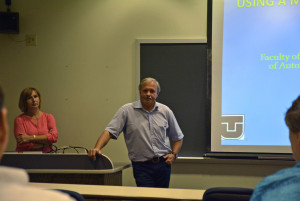Improving quality of life for seniors through engineering

Professor Alena Galajdova and Professor Dusan Smisik of the Technical University of Kosice, Slovakia (TUKE) visit SUNY Polytechnic Institute in Utica Summer 2017 to discuss the ways in which engineering is creating better quality of life for seniors.
Improving the quality of life for seniors was the topic of the day as two professors from the Technical University of Kosice, Slovakia (TUKE) visited SUNY Polytechnic Institute this summer to talk about the difference that engineering can make in that goal.
In a presentation titled “Ageing and New ICT Services to Improve Quality of Life for Seniors,” Professor Dusan Simsik, head of the Department of Automation, Control and Human Machine Interactions for the College of Mechanical Engineering at TUKE discussed MonAMI, a platform that allows seniors to control everything from their lights to their shades/blinds on their windows from a single point, such as a desktop computer, a PDA, tablet, or a smartphone. It also provides updates and reminders of events like doctor appointments, when it’s time to take pills, and offers updates to caregivers and family members. Those reminders can be anything from gas and smoke detection to a senior forgetting to turn off a device that shouldn’t remain on, or even if the temperature has dropped too low for too long.
“We tested it with 20 elderly people living alone at their households,” Professor Simsik said. “For 55% of participants, the services were very helpful.”
Also presenting that day was Professor Alena Galajdova, Deputy Head of the Department of Automation, Control and Humane Machine Interactions for the College of Mechanical Engineering at TUKE.
Professor Galajdova’s presentation, titled “Training of Seniors at risk of falling using a mechatronical rehabilitation device” discussed the idea of designing and developing a type of “shoe” that is able to change its height and configuration based on gait, or how a person walks.
The perturbation, or process of the person’s walk that deviates from the normal path, is uploaded by a computer and then downloaded to the ‘shoe’ device. That device is then worn by the senior to help correct any issues in walking that could lead to falls.
Clinical trials were done in Israel, Switzerland, and Italy.
“We had 20 seniors we tested,” said Professor Galajdova. “They walked twice a week for eight weeks in this device.”
Both presentations emphasized the hope that engineering and assistive technologies could lead to a vast improvement of the quality of life for seniors.
Recent Comments
Archives
- September 2018
- August 2018
- May 2018
- April 2018
- March 2018
- February 2018
- January 2018
- December 2017
- November 2017
- October 2017
- September 2017
- May 2017
- April 2017
- March 2017
- February 2017
- January 2017
- December 2016
- November 2016
- October 2016
- September 2016
- August 2016
- May 2016
- April 2016
- March 2016
- February 2016
- January 2016
- December 2015
- November 2015
- October 2015
- September 2015
- August 2015
- May 2015
- April 2015
- March 2015
- February 2015
- January 2015
- December 2014
- November 2014
- October 2014
- September 2014
- August 2014
- May 2014
- April 2014
- March 2014
- February 2014
- January 2014
- December 2013
- November 2013
- October 2013
- September 2013
- August 2013
- June 2013
- May 2013
- April 2013
- March 2013
- February 2013
- January 2013
- December 2012
- November 2012
